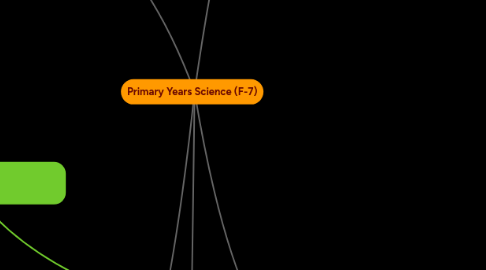
1. Structuring - Science Inquiry Skills
1.1. Questioning & Predicting
1.1.1. Harnessing natural curiosity (Abruscato &DeRosa 2010, p.6)
1.2. Planning & Conducting
1.2.1. Spiral & guided construction of tasks (Abruscato &DeRosa 2010, p.6)
1.3. Processing & Analysing Data & Information
1.3.1. Abstract - upper primary
1.4. Evaluating
1.4.1. 5 E's
1.5. Communicating
1.5.1. Scientific literacy
1.5.2. literacy in science
2. Pedagogy
2.1. Excite, encourage curiosity & make students want to explore (Harrison 2007, p.7)
2.1.1. Christian WV:
2.2. Motivation: Autonomy, Mastery & Purpose
2.2.1. Multiple intelligence awareness
2.3. Science learning cycle
2.3.1. 5'E's (AAS 2012, p.1)
2.4. Constructivism
2.4.1. Investigatory Play
2.4.2. Real world based
2.4.3. Group work
2.5. Pedagogical frameworks for science
2.5.1. Intergrated Approaches
2.5.2. Disiplinary approaches
3. Inquiry Based Learning
3.1. Responding to 'Children's Science' - growing learning from this
3.2. Teacher guidance required to progress from children's science.
4. General Capabilities
4.1. Numeracy
4.1.1. Measurement & accuracy
4.1.1.1. Qualitative & Quantitative Data
4.1.2. Patterns
4.1.3. Graphs
4.2. ICT
4.2.1. Research
4.2.2. Communicate
4.2.3. Collect data
4.2.4. Bringing the world to the classroom
4.2.5. Generating information
4.3. Literacy
4.3.1. Decode & encode info.
4.3.2. Science's use of multi modal methods
4.3.3. Explore & Analyse text
4.3.4. Recount & present data
4.3.5. Contextual awareness
4.4. The three general capabilities are intricately intertwined throughout the science understanding strand
5. Unfolding - Science Understanding
5.1. Biological Sciences
5.1.1. Living things & their features
5.1.1.1. Organistion
5.1.1.2. Observation
5.1.1.2.1. Function
5.1.1.2.2. Form
5.1.1.2.3. Using senses
5.1.1.2.4. Sketching
5.1.1.3. Evident in every day life (CSTSCT 1998, p. 22)
5.1.1.3.1. Plants
5.1.1.3.2. Animals
5.1.1.3.3. Humans
5.1.2. Non living objects
5.1.2.1. Observation
5.1.2.1.1. Function
5.1.2.1.2. Form
5.1.2.2. Curiosity
5.1.2.2.1. What defines non living
5.1.2.3. Relationship with living objects
5.2. Chemical Sciences
5.2.1. Materials & their properties
5.2.1.1. Change
5.2.1.1.1. States of matter
5.2.1.2. Uses
5.2.1.2.1. Properties matching application
5.2.2. Mixtures & solutions
5.2.2.1. Change
5.2.2.2. Reactions
5.2.2.2.1. Life impacts
5.2.3. Hidden Science
5.3. Earth & Space Sciences
5.3.1. The Earth and its environments
5.3.1.1. Investigations
5.3.1.1.1. Scientific Literacy
5.3.1.2. Patterns & Order
5.3.1.2.1. Weather
5.3.1.2.2. Earth Resources
5.3.1.2.3. Water
5.3.1.3. Worldviews
5.3.1.4. Astronomy
5.3.1.4.1. Embracing natural wonder
5.4. Physical Sciences
5.4.1. Energy
5.4.1.1. Transfer
5.4.1.1.1. Electricity
5.4.1.1.2. Light
5.4.1.1.3. Sound
5.4.1.2. Transformation
5.4.1.2.1. Why & How
5.4.2. Forces
5.4.2.1. Purpose
5.4.2.1.1. How do forces effect us?
5.4.2.2. Form
5.4.2.2.1. Abstract i.e upper prim.
6. Enabling - Science As a Human Endeavour
6.1. Nature & Development of Science (ACARA n.d.1)
6.1.1. Questioning & Data gathering
6.1.2. Scientific advances
6.2. Use & Influence of Science (ACARA n.d.1)
6.2.1. Ethics & Morals
6.2.2. Posing and responding to questions
6.2.2.1. Life long skill
6.3. Has Human & Philosophical Significance (ASE as cited by Devereux 2007, p.5)
6.3.1. Christian Worldview
6.4. A way of knowing and responding to the world (ACARA n.d.2)
6.4.1. Understanding God's creation
7. 'Children's Science'
7.1. Students construct science ideas from everyday experiences (Campbell & Tytler 2007, p.26)
7.2. Teaching is more than explanation and demonstration
7.3. Foundation - Year 2 ACARA: Awareness of self and world
7.4. Respectful teaching
7.4.1. Christian WV
